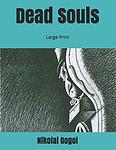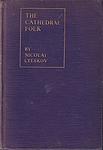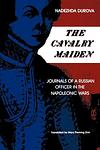The Greatest Russian "Historical fiction" Books of All Time
Click to learn how this list is calculated.
This list represents a comprehensive and trusted collection of the greatest books. Developed through a specialized algorithm, it brings together 300 'best of' book lists to form a definitive guide to the world's most acclaimed books. For those interested in how these books are chosen, additional details can be found on the rankings page.
Genres
Historical fiction is a genre of literature that combines fictional stories with real historical events, settings, and characters. These books often take place in a specific time period and are based on research and factual information, but also include imaginative elements to create a compelling narrative. Historical fiction allows readers to experience the past in a unique and engaging way, while also providing insight into the social, cultural, and political issues of the time.
Countries
Date Range
Reading Statistics
Click the button below to see how many of these books you've read!
Download
If you're interested in downloading this list as a CSV file for use in a spreadsheet application, you can easily do so by clicking the button below. Please note that to ensure a manageable file size and faster download, the CSV will include details for only the first 500 books.
Download-
1. War and Peace by Leo Tolstoy
Set in the backdrop of the Napoleonic era, the novel presents a panorama of Russian society and its descent into the chaos of war. It follows the interconnected lives of five aristocratic families, their struggles, romances, and personal journeys through the tumultuous period of history. The narrative explores themes of love, war, and the meaning of life, as it weaves together historical events with the personal stories of its characters.
-
2. Doctor Zhivago by Boris Pasternak
Set against the tumultuous backdrop of the Russian Revolution, the book follows the life of a physician and poet, Yuri Zhivago, as he navigates the political and social upheaval of the early 20th century. Torn between his love for two women, his wife Tonya and his passionate mistress Lara, Zhivago's personal struggles mirror the larger societal changes occurring around him. The novel explores themes of love, war, and the human spirit, offering a poignant and complex portrait of life during a time of revolutionary change.
-
3. Dead Souls by Nikolai Gogol
In this satirical novel, a man travels through Russia buying up the titles to deceased serfs (or "souls") from their naive landowners, under the guise of a get-rich-quick scheme. However, his real plan is to use these "dead souls" to create a phantom estate and secure a massive loan. The story explores the corruption and greed prevalent in 19th-century Russian society and provides a unique perspective on the human condition.
-
4. A Hero of Our Time by Mikhail Lermontov
"A Hero of Our Time" is a novel that follows the life of a young, charismatic, yet cynical and emotionally detached Russian officer, who serves in the Caucasus region. The story is told through a series of narratives, including the officer's own journal entries, revealing his manipulative and self-destructive tendencies. The novel explores themes of disillusionment, morality, and the nature of heroism in the 19th century Russian society.
-
5. Life and Fate by Vasily Grossman
"Life and Fate" is a sweeping epic that explores the human condition during the Siege of Stalingrad in World War II. The novel delves into the lives of a wide range of characters, from soldiers and scientists to children and victims of the Holocaust, providing a stark and unflinching portrayal of the horrors of war, the brutality of totalitarianism, and the resilience of the human spirit. At the same time, it also examines themes of love, loss, and the struggle for freedom and dignity in the face of overwhelming adversity.
-
6. And Quiet Flows The Don by Mikhail Sholokhov
"And Quiet Flows The Don" is a sweeping epic set in the early 20th century, following the lives of several characters in the Don River region of Russia. Through the lens of the Melekhov family, the novel explores the impact of war, revolution, and societal changes on both individuals and the community as a whole. With vivid descriptions and rich character development, the book delves into themes of love, loyalty, and the struggle for survival amidst the tumultuous backdrop of historical events.
-
7. Cancer Ward by Aleksandr Solzhenitsyn
"Cancer Ward" is a poignant novel set in a Soviet cancer hospital in the mid-1950s. It follows the lives and struggles of patients and doctors, exploring their personal histories, relationships, and the political environment of the time. The hospital serves as a metaphor for the oppressive Soviet state, with cancer symbolizing the malignant growth of totalitarianism. The book also explores themes of mortality, the human spirit, and the will to survive.
-
8. Petersburg by Andrei Bely
"Petersburg" is a symbolist novel set in the heart of Russia during the 1905 Revolution. It follows the story of a young man who is given the task of assassinating his own father, a high-ranking government official, by a radical political group. The narrative is a complex mix of politics, family drama, and philosophical introspection, all set against the backdrop of a city in turmoil. The novel is renowned for its vivid and poetic descriptions of the city itself, making Petersburg as much a character in the story as the people who inhabit it.
-
9. Red Cavalry by Isaac Babel
The book is a collection of short stories that delve into the experiences of a Jewish political commissar serving with the Cossack regiment in the Soviet Red Army during the Polish-Soviet War of 1919-1921. Through a series of vivid, often brutal vignettes, the narrative explores the harsh realities of war, the cultural tensions between the Jewish intellectual and the Cossack soldiers, and the moral ambiguities faced by individuals caught in the turmoil of conflict. The stories are renowned for their stark, powerful prose and their unflinching examination of the human condition amidst the chaos of war.
-
10. The Enchanted Wanderer by Nikolai Leskov
"The Enchanted Wanderer" is a collection of short stories that follow the life of a Russian serf, Ivan Flyagin, who is destined to wander forever and never die. Throughout his travels, he experiences a myriad of adventures including becoming a monk, being captured by Tartars, and falling in love. The stories are filled with folkloric elements and offer a vivid depiction of 19th-century Russian society.
-
11. Mother by Maxim Gorky
This novel centers around a working-class Russian woman who becomes involved in revolutionary activities after witnessing the struggles and injustices faced by her son and his comrades. Despite her initial fear and hesitation, she evolves into a dedicated activist, smuggling illegal literature and participating in strikes. The narrative provides a powerful exploration of the personal and societal transformations brought about by political activism, set against the backdrop of pre-revolutionary Russia.
-
12. The Cathedral Folk by Nikolai Leskov
"The Cathedral Folk" is a novel set in 19th-century Russia, revolving around the lives of the people connected to the construction of a grand cathedral. The narrative delves into the intricacies of Russian society, exploring themes of faith, tradition, and the conflicts between progress and the preservation of the old ways. Through a rich tapestry of characters, including craftsmen, clergy, and local gentry, the book examines the human spirit and the complexities of moral choices in a time of social change, all while painting a vivid picture of Russian provincial life with its unique blend of piety, superstition, and the struggle for personal redemption.
-
13. The Artamonov Business by Maxim Gorky
"The Artamonov Business" is a multi-generational saga that follows the rise and fall of a Russian family's business empire from the 1860s up to the Russian Revolution. The narrative explores the dynamics of the Artamonov family, their personal struggles, moral dilemmas, and the impact of their actions on those around them. The story also provides a critical examination of the socio-economic changes in Russia during this period, highlighting the transformation from a feudal society to a more capitalist one and the accompanying moral decay.
-
14. Summer in Baden-Baden by Leonid Tsypkin
"Summer in Baden-Baden" is a unique blend of fact and fiction that intertwines the author's own travels to Leningrad with a reimagining of Fyodor Dostoevsky's summer in Baden-Baden, Germany. The narrative shifts between the two journeys, exploring themes of obsession, identity, and the power of literature. The author's fascination with Dostoevsky serves as a lens through which he examines his own life and experiences as a Jew in Soviet Russia, while also providing a fresh perspective on the famous Russian author's life and works.
-
15. The Foundation Pit by Andrey Platonov
The book is a dark and satirical portrayal of the Soviet Union's early years of communism, focusing on a group of workers involved in the construction of a gigantic pit intended to lay the foundations for a utopian future. As they dig deeper, the narrative delves into the absurdities and tragedies of the Soviet system, revealing the disconnect between the lofty ideals of the revolution and the harsh realities faced by the people. The characters, ranging from disillusioned laborers to ideologically blinded officials, grapple with the meaning of progress and human purpose in a society where language and thoughts are contorted by political dogma, ultimately questioning the human cost of a forced march towards a promised paradise.
-
16. Boris Godunov by Alexander Pushkin
The narrative centers on the tumultuous political landscape of Russia following the death of Tsar Ivan the Terrible. It delves into the ascent of Boris Godunov to the Russian throne amidst power struggles, rumors, and the specter of a pretender claiming to be the rightful heir. The story explores themes of ambition, guilt, and the heavy burden of leadership as Boris grapples with his conscience and the consequences of his actions in a period marked by political intrigue, betrayal, and the quest for legitimacy in a nation on the brink of turmoil.
-
17. August 1914 by Aleksandr Solzhenitsyn
"August 1914" is a historical novel set during the early days of World War I, focusing on the disastrous Battle of Tannenberg on the Eastern Front. The book provides a detailed portrayal of the Russian army's defeat, largely due to incompetent leadership and lack of communication. The narrative also delves into the lives of the soldiers and civilians involved, offering a broad examination of Russian society and the impending revolution.
-
18. The Cossacks by Leo Tolstoy
The novel is a coming-of-age story that follows the journey of a young Russian aristocrat who, disillusioned with his privileged life and the superficiality of society, seeks meaning and authenticity. He joins a Cossack community in the Caucasus, where he is drawn to the simplicity and vigor of their lifestyle. As he becomes entangled in the local conflicts and customs, he falls in love with a Cossack girl, which leads to a deep internal struggle between his previous values and his newfound admiration for the Cossack's way of life. The protagonist's journey is one of self-discovery, cultural immersion, and the quest for a genuine existence amidst the backdrop of the rugged and unforgiving landscape of the Russian frontier.
-
19. The Road To Calvary by Aleksey Nikolayevich Tolstoy
This historical novel delves into the tumultuous period of the Russian Revolution and Civil War, tracing the lives and fates of two sisters, Dasha and Katya Bulavina, who navigate the chaotic landscape of early 20th-century Russia. Through their eyes, readers experience the dramatic shifts in society and personal relationships brought on by the upheaval. The narrative captures the complexity of the era, exploring themes of loyalty, betrayal, love, and loss against the backdrop of a country undergoing profound transformation. The sisters' journey is a poignant exploration of how historical events shape individual destinies and the human capacity for resilience in the face of adversity.
-
20. Sofia Petrovna by Lydia Chukovskaya
The book is a poignant narrative set during the Stalinist purges of the 1930s in the Soviet Union. It follows the story of a loyal and hardworking widow who is confronted with the brutal reality of the regime when her beloved son is arrested on false charges. As she navigates the Kafkaesque bureaucracy to seek justice for her son, her faith in the government and its policies is shattered. The novel offers a harrowing look at the terror of the Great Purge and the impact of political oppression on the lives of ordinary citizens, as the protagonist grapples with the disintegration of her world and the moral dilemmas posed by a society steeped in fear and denunciations.
-
21. The Cavalry Maiden by Nadezhda Durova
"The Cavalry Maiden" is a vivid memoir of a young Russian woman who defies the conventions of her time by disguising herself as a man to join the Russian cavalry during the Napoleonic Wars. The narrative recounts her extraordinary experiences on the battlefield, her struggles with her secret identity, and her observations of military life during a tumultuous period in history. The author's passion for military service and her quest for personal freedom and adventure shine through as she provides a unique perspective on the roles of gender and social expectations in the early 19th century.
-
22. The Captain's Daughter by Alexander Pushkin
The novel is a historical romance set against the backdrop of the Pugachev Rebellion during the reign of Catherine the Great. It follows the young nobleman Pyotr Grinyov as he is sent to a remote military outpost where he falls in love with Masha, the daughter of the fort's captain. Their idyllic life is shattered by the uprising of the Cossack leader Pugachev, who claims to be the true tsar. Amidst the chaos, Grinyov must navigate a path between his loyalty to the crown, his love for Masha, and the unpredictable mercy of the rebel leader, whose favor he inadvertently gains. The story blends adventure, love, and historical drama, exploring themes of honor, fate, and the complexities of human nature.
-
23. Chevengur by Andrey Platonov
The book is a complex and philosophical tale set in the aftermath of the Russian Revolution, exploring the lives of various characters in a small town as they grapple with the utopian ideals of communism and the harsh realities of its implementation. Through the experiences of these characters, including a young revolutionary and a disenchanted wanderer, the narrative delves into themes of human nature, societal transformation, and the search for meaning in a world undergoing radical change. The story's blend of surrealism, poetic language, and political commentary creates a unique and often disquieting examination of the Soviet dream and the disillusionment that followed its pursuit.
-
24. The History Of A Town by Mikhail Saltykov-Shchedrin
"The History of a Town" is a satirical novel that chronicles the absurd and often grotesque history of a fictional Russian town, serving as an allegory for the bureaucratic inefficiencies, corruption, and societal stagnation of Tsarist Russia. Through a series of vignettes and historical accounts, the narrative lampoons the town's inept leaders and the apathetic or complicit townsfolk, using dark humor and irony to critique the autocratic government and the broader socio-political climate of the time. The work is a scathing commentary on the folly of human nature and the cyclical nature of history, where progress is continually undermined by human vices and incompetence.
-
25. The White Guard by Mikhail Bulgakov
Set against the backdrop of the Ukrainian city of Kiev during the tumultuous Russian Civil War of 1918, the novel follows the Turbin family as they navigate the chaos and shifting allegiances of the time. The story focuses on the two Turbin brothers, who are officers in the White Guard, a faction fighting to preserve the Russian Empire against the encroaching Bolshevik Red Army. As the city is besieged and alliances falter, the family grapples with questions of loyalty, survival, and the meaning of home amidst the collapse of the old world and the uncertainty of the new. The narrative combines a rich portrayal of historical events with a deeply personal family saga, exploring themes of courage, brotherhood, and the tragic futility of war.
Reading Statistics
Click the button below to see how many of these books you've read!
Download
If you're interested in downloading this list as a CSV file for use in a spreadsheet application, you can easily do so by clicking the button below. Please note that to ensure a manageable file size and faster download, the CSV will include details for only the first 500 books.
Download






















